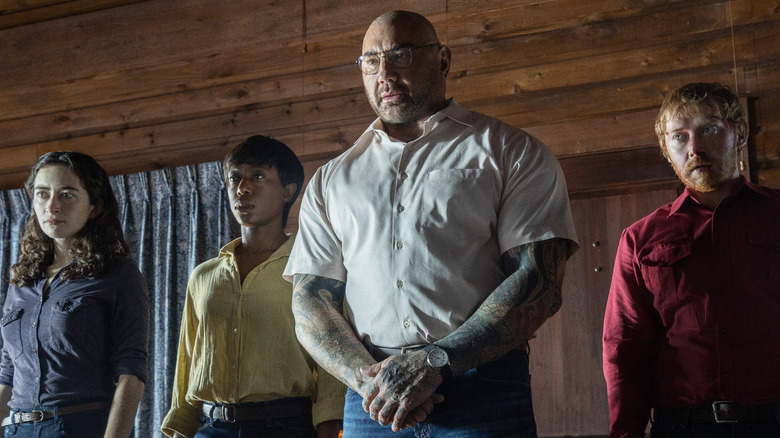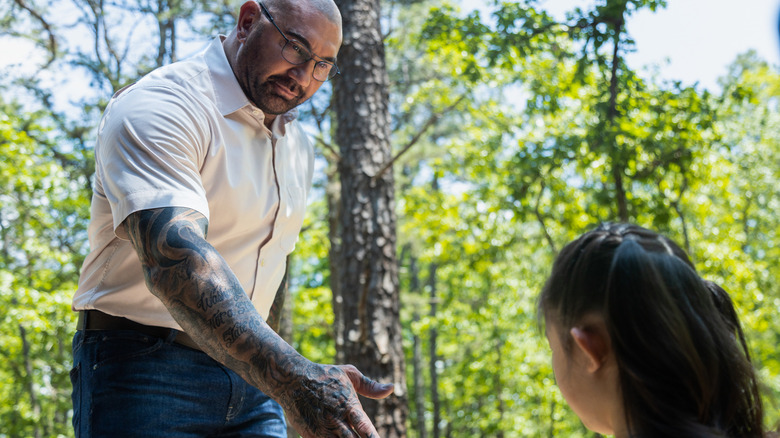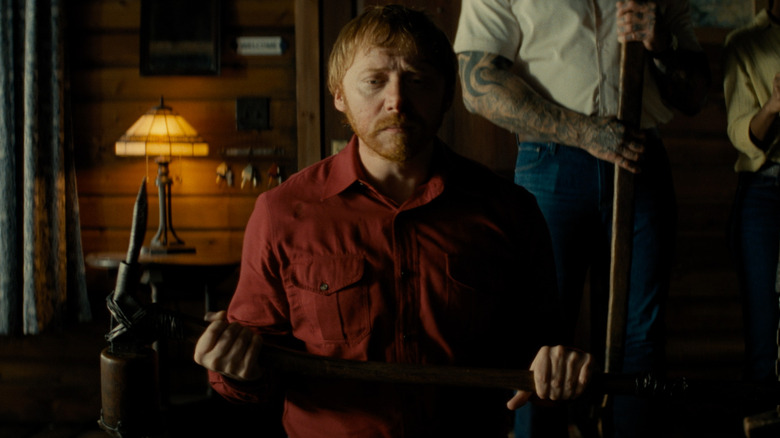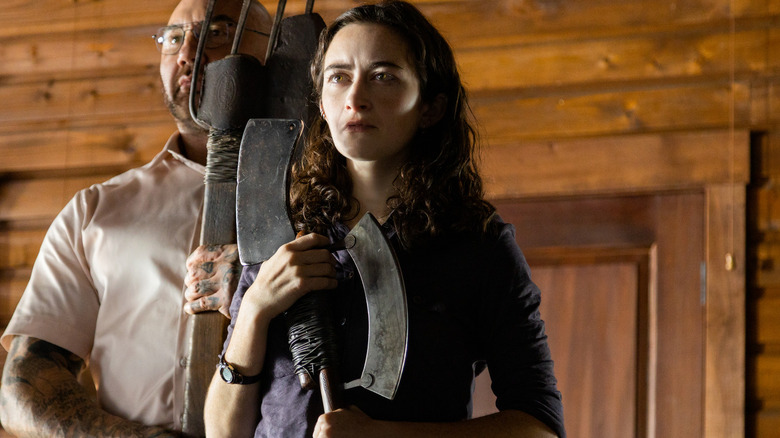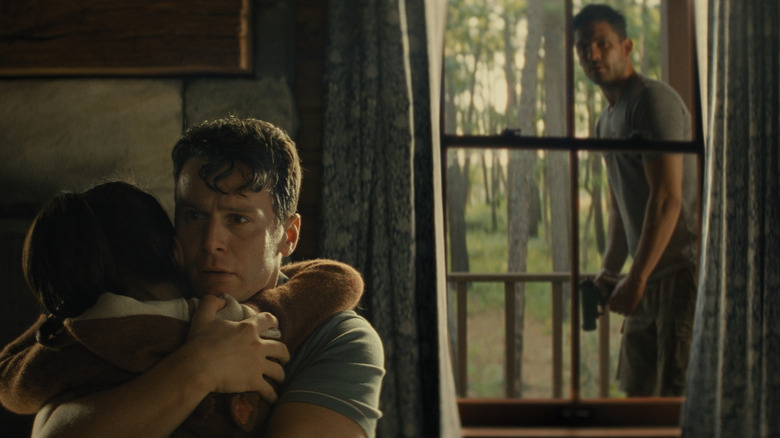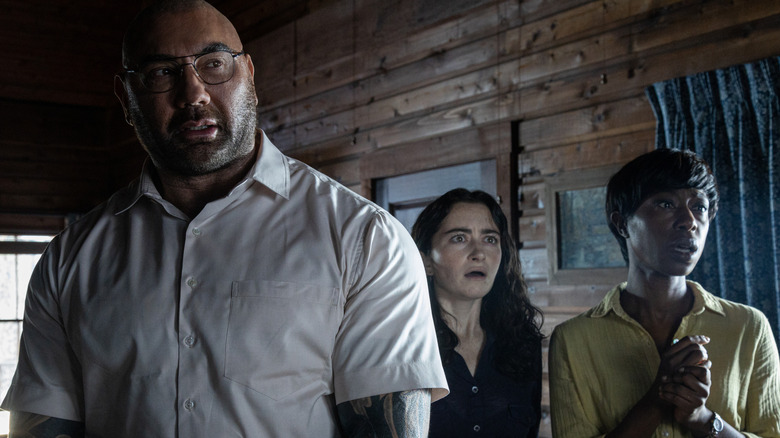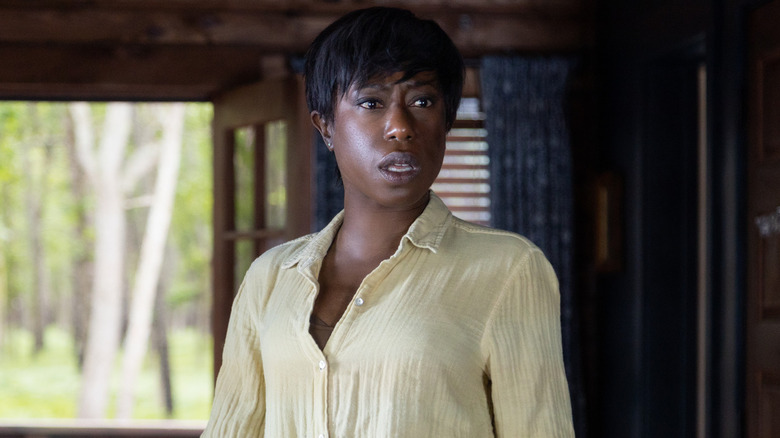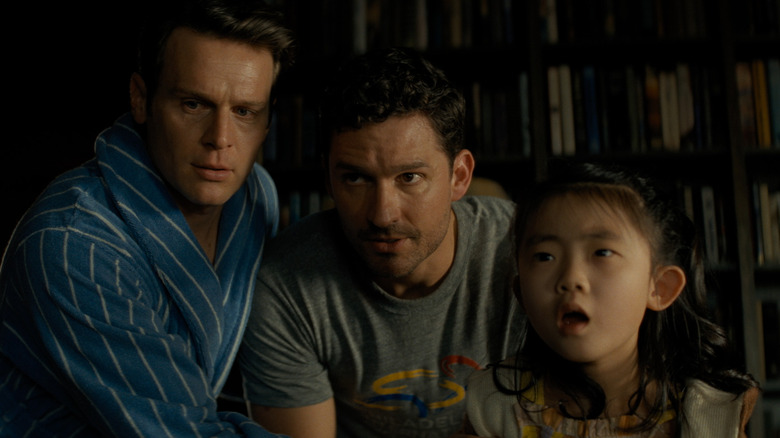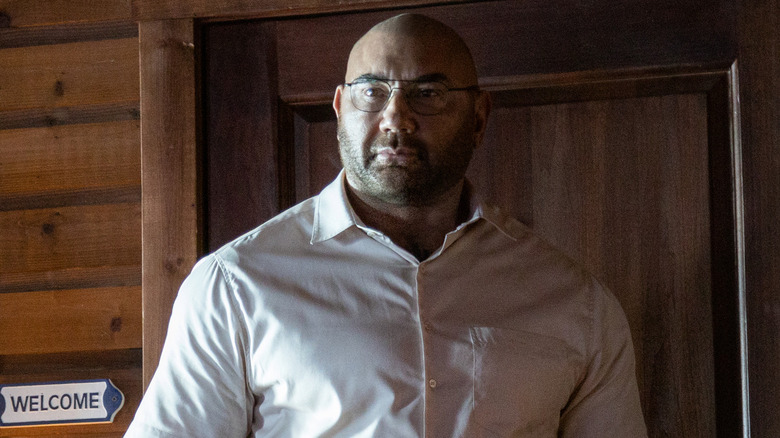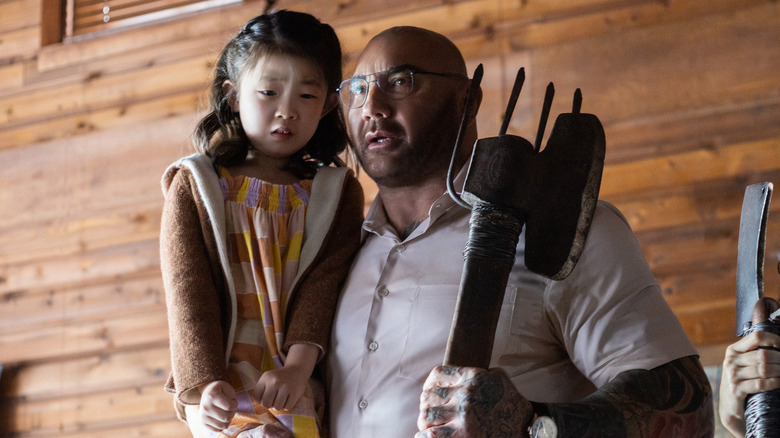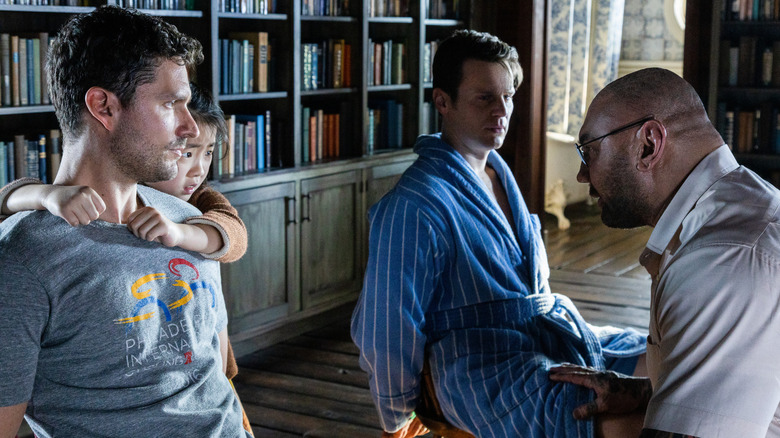Knock At The Cabin Moments That Made Our Skin Crawl
M. Night Shyamalan is back with "Knock at the Cabin," a horror movie with all the usual Shyamalan traditions: chills, twists, and an obligatory cameo by the writer-director himself. Happily, however, it lacks some other common Shyamalan inclusions, like awkward, unnatural dialogue and stiff, vacant acting. In fact, the performances in "Knock at the Cabin" are great — especially Dave Bautista's exceptionally sincere portrayal of the reluctant, apologetic harbinger of the apocalypse, Leonard. The overall quality of the acting helps cement "Knock at the Cabin" as a relative success, and it is a huge improvement on Shyamalan's previous takes on the apocalypse in "The Happening" and "After Earth."
Despite the film's general slowness and quietness, it still manages to raise the hairs on your neck — sometimes by suddenly devolving into stark violence and sometimes by simply leaving you unsure of what is actually real. The merit of "Knock at the Cabin" lies in its ability to invoke just as much skin-crawling from a theosophical debate between a married couple as it does from an execution with a homemade axe.
We're comfortable admitting that Shyamalan's latest movie left us unsettled, so to journal away our unease, here are the "Knock at the Cabin" moments that made our skin crawl the most.
Dave Bautista's introduction
In an exclusive interview with Looper, M. Night Shyamalan made it abundantly clear how confident he was in casting Dave Bautista and praised the actor's talent, saying "I thought there was something extraordinary about this individual ... I thought he was in the right place in his life to commit in the way that I ask actors to commit to my movies, and I was right. He's a rare, rare individual, and I'm super lucky." Not only is his director behind him but so are we — Bautista's portrayal of Leonard is outstanding, and that fact becomes apparent just a few minutes into the film during Leonard's skin-crawling introduction to Wen (Kristen Cui).
In the first scene of "Knock at the Cabin," sweet, young Wen is collecting grasshoppers outside of her parent's cabin when Leonard comes strolling up to her from the middle of the woods. That alone provokes some anxiety, as does the difference between Leonard's giant, muscled frame and the small girl. Yet it is Leonard himself that kicks off the movie's frights, specifically how polite he is. He's kind, empathetic, and all-around charming, which makes everything he's doing even worse.
Thanks to all of the tiny details that Bautista puts into Leonard, he comes across as terrifying and charismatic at the same time, and the combination is genuinely stressful. "Knock at the Cabin" begins with a hulking, 6'4", muscle-bound stranger bending down to ask a little girl about herself, and somehow, the worst part is that he's still kind of likable.
Redmond's death
For all the creepiness to be found in the existential mysteries and small details in "Knock at the Cabin," some of its most uncomfortable moments are immediate, obvious, and exactly what you'd expect. They hit us hard because they hit a character hard. The movie's first example is the death of Redmond (Rupert Grint), which is both the first death in the film overall and also the first confirmation that the four strangers are the real deal — whether their divine apocalypse is or not.
Unlike his three companions, Redmond is abrasive — even teasing genuine sadism for a few moments — and yet he willingly and peacefully kneels down and offers himself as a sacrifice. It's chilling that such an apparent force of nature would consent to their own death — especially so early on in the film — and it's even more chilling when his three companions all carry that death out.
After Redmond covers his head in a bag, Leonard, Adriane (Abby Quinn), and Sabrina (Nikki Amuka-Bird) gather just behind him, raise their improvised polearms, and bring them down on Redmond's head with one combined, sickening thud. As the blood fills his mask and runs down his shirt, M. Night Shyamalan cuts to the other big scare in the room: the faces of the innocent family forced to watch it happen. Andrew (Ben Aldridge) and Eric (Jonathan Groff) watch with horror while little Wen turns away, squeezing her eyes shut and clamping her ears.
Adriane's death
Unfortunately for Andrew and Eric's sweet family, the four strangers — or Four Horsemen, if you're a believer — possess one frustratingly obvious trait: there are four of them. After Redmond's sickening death at the hands of the other three, they warn Andrew and Eric that the rest will die one by one until the couple complies with their deadly game. That leaves three more brutal executions to endure, each certain to be more traumatizing than the last.
Next on the chopping block is Adriane, and her death is even more uncomfortable than Redmond's, almost entirely due to how she brings it up to Andrew and Eric. Unlike Redmond, whose caustic persona only gives way to sincere fear in his final few seconds, Adriane makes her mortal terror known early and in detail. Trying to appeal to Eric and Andrew's empathy — with empathy, in general, being a huge theme in the movie — Adriane tells them that she's the next in line to be sacrificed at Leonard and Sabrina's hands. Or more accurately, the ends of their rusty axe and mace.
Shaking and tearing up, she reveals how terrified she really is, especially because she has a young son at home whom she wants nothing more than to survive to see. When her pleading fails and the two weapons slam down on her skull, Eric and Andrew — like all of us watching — are left thinking of that boy: either a cruel lie of Adriane's or one very real orphan.
Andrew vs. Sabrina
It seems like nothing is ever easy in movies, especially in horror movies. Around the midpoint of "Knock at the Cabin," Wen manages to escape the cabin but is caught mere minutes later by Leonard. Likewise, Andrew is able to cut himself free of his bonds and escape the cabin, hoping to reach the pistol kept in the trunk of his SUV. Before he can reach it, Sabrina catches up to him and warns him to come back inside peacefully, or else she'll be forced to hurt him until he does. But because nothing is ever easy, Andrew refuses to comply and the fight is on. Unlike the deaths of Redmond and Adriane, Sabrina takes a good, long while to meet her end.
As Andrew tries to scramble into the vehicle, Sabrina uses her heavy, blunt mace to smash his knee with an awful crack. He retaliates with an arc of gravel to Sabrina's eyes and uses the brief window of blindness and pain to get in the SUV and crawl to the gun. Even when he reaches it, the tortuous encounter continues — in fact, it gets worse. Crying and begging Andrew not to make her do it, Sabrina tries to keep him from loading the gun by slowly, excruciatingly sinking the sharp end of her weapon directly into his kidney. As the dirty, jagged point sinks deeper and deeper into Andrew's side, it becomes increasingly difficult to watch and is easily one of the most skin-crawling moments of the film.
The first two plagues
One of the biggest challenges faced by "Knock at the Cabin" is balancing the small, self-contained cabin sequences with the calamitous events in the wider world. The latter is primarily handled through news reports of the tragedies — which the four strangers call the four plagues — the first two of which are their own brand of eerie.
Just as Leonard and the rest predict, Redmond and Adriane's deaths are immediately followed by plagues akin to signs of the Biblical apocalypse. The first — which happens just moments after Redmond's death — comes in the form of a massive and destructive tsunami, the true power of which is never revealed. What is shown is the wave slowly and ominously appearing off the coast of Portland, Oregon, eventually overtaking a crowd of panicked beachgoers. Hundreds die, at least, with thousands more likely dead within the next few minutes.
As bad as a state-sized tsunami is, the plague following Adriane is worse. Adriane's plague is a literal plague, an aggressively infectious virus that only targets children. In one of the most revolting scenes in all of "Knock at the Cabin," we see a number of children lying on stretchers in a quarantined hospital ward. The worst moment of them all is when the camera zooms in on one young girl, uncontrollably coughing thick, black sludge out onto herself.
Finishing the ritual
It's one thing to see the four intruders taking each other's lives as part of their twisted ritual, but it's something far worse to see them brutalize each other's corpses after they're already dead, seemingly just as an insurance measure. That's exactly what happens to Sabrina's body after Andrew fatally shoots her, defying the preordained time and manner of death for the "Horseman."
When Andrew manages to escape, grab his gun, and chase Sabrina off, the third sacrifice is seemingly averted. As Andrew holds Leonard at gunpoint and attempts to free his family, Sabrina swiftly bounds back into the cabin, prompting a startled Andrew to shoot her — a lucky break for Leonard, at least by the standards of his possibly-portentous ideology. Even better for Leonard, he succeeds in gaining control of the gun and the whole situation once more. Once back in control, and without warning, the burly Leonard grabs his ceremonial weapon — a combination axe and pitchfork — and brings it down hard on Sabrina's lifeless head. Eric and Andrew are understandably surprised and mortified, as the big man uses all of his might to rain down a series of blows on an already-dead Sabrina. To Leonard, though, this is just a continuation of the predestined ritual, and so he goes about it as matter-of-factly as if he were hammering a nail. We know, however, that this particular nail was a nurse, a sister, and a human being, and to see her brutalized so viciously is hard to stomach.
The planes
It's debatable what sequence in "Knock at the Cabin" is truly the most unnerving, but if we had to pick, our money is on the third plague, when the sky falls to the Earth like little pieces of glass. That's how Leonard puts it, anyway, but the truth of the situation is far more horrific: Suddenly, without any warning, thousands of passenger planes all across the globe lose power and plummet to the ground.
As the family and Leonard watch the news report, they become unable to look away from the unparalleled tragedy. When the Hindenburg crashed, killing dozens on board, newscaster Herbert Morrison famously cried out, "Oh, the humanity!" Imagine his response, then, if he had been on hand to see the third plague brought about by Sabrina's death, in which hundreds of thousands, and potentially millions, of people fell from the sky at once.
For viewers, Shyamalan did an excellent job conveying the inconceivable, inhuman calamity and the terror it wrought. The news stations playing in Andrew and Eric's cabin showed recording after recording captured by helpless onlookers, all of them layered with panic-stricken screams and hopeless wails. It's not an easy image to shake, even after the movie ends, and it may very well represent the moment in the film when many viewers began praying for Andrew and Eric to hurry up and choose one of them to sacrifice so that the suffering could end.
Leonard takes his life
With Redmond, Adriane, and Sabrina all dead and the first three plagues unleashed, the only thing left for Leonard to do is offer Eric and Andrew one last chance: choose one of the two to be sacrificed and carry out the deed themselves, or willingly allow a divine apocalypse to kill every last person on Earth. The couple is still unconvinced of the truth behind Leonard's claims, especially given the seemingly coincidental and preplanned nature of many of them, and so give Leonard their last refusal. If there was any doubt as to Leonard's sincerity previously, it now washes away with his blood.
In keeping with the ritual, Horseman must be killed by Horseman, and as both the final sacrifice and the final executioner, Leonard takes his own life. Sitting in a chair on the cabin's back porch, Leonard prepares a knife and follows through. The moment is particularly skin-crawling because of how impossibly resigned he is to the situation — Leonard had a life before all of this, and certainly had plans for a life after this — at least, he did before the visions — and yet, he is so convinced of the truth of his visions that he calmly, comfortably sacrifices himself. Even during this, his only sound is a quick, faint gurgling, ready for death all the way until he meets it.
If you or anyone you know is having suicidal thoughts, please call the National Suicide Prevention Lifeline by dialing 988 or by calling 1-800-273-TALK (8255).
The sweetest murderers ever
In between all the big, blatant horrors in "Knock at the Cabin," the film packs itself full of tiny little specks of anxiety, most of them coming from those insane, doomsaying, murderous strangers and how unnervingly polite they all are. The opening scene featuring Leonard and Wen is a powerful example, but in truth, there are dozens of others all throughout the story.
In one scene, a terrified Wen is calmed by Adriane, who cooks her an apparently delicious plate of eggs and offers her some warm human connection. In another, a concussed Eric is treated by Sabrina, who cleans and wraps his wound with care while telling him about her life before those awful visions. There are a ton of these human moments, bits of empathy and tenderness, all throughout the film, and they make the murder and mayhem all the more sickening.
Unlike more stereotypical horror films in which the hook-handed killer is nothing but a faceless monster, "Knock at the Cabin" yanks you back and forth between evil and empathy. Maybe the most skin-crawling aspect of the film is the possibility that these violent strangers may truly be otherwise kind, normal people forced into an impossible, lose-lose situation.
Everything left unspoken
As the credits begin to roll for "Knock at the Cabin," the movie's most skin-crawling feature becomes clear: the many questions it never answers, seemingly all of which have deeply disturbing implications about our very existence. Sure, we watched four strange people execute themselves, Andrew kill Eric, and a series of mass tragedies, but by the film's end, those problems are more or less over. What isn't over — and what has only just begun as the movie ends — is the slew of profoundly unsettling questions we're forced to ask ourselves with little hope of ever reaching a conclusion.
We simply never know whether or not the visions and the apocalypse were real. What is even worse is that whether or not they are real, the entire ordeal is still horrific — it's just a question of what type of horror we get. On the one hand, the synchronization between the Horsemen's sacrifices and the world tragedies, along with their sheer scale, suggests that the entire situation was actually divine. That means that God — or something similarly powerful — really does require ritual human sacrifices by those with true love in order to allow reality to continue.
On the other hand, the revelation that Redmond is actually the same ex-con who attacked Eric in a bar suggests that Andrew's first instincts were correct and this was all an elaborate hoax and hate crime by a deranged suicide cult. In either case, the true nature of "Knock at the Cabin" makes our skin crawl, even when the ordeal is over.
If you or someone you know is dealing with spiritual abuse, you can call the National Domestic Violence Hotline at 1−800−799−7233. You can also find more information, resources, and support at their website.
